CCG Holds 7th China and Globalization Forum
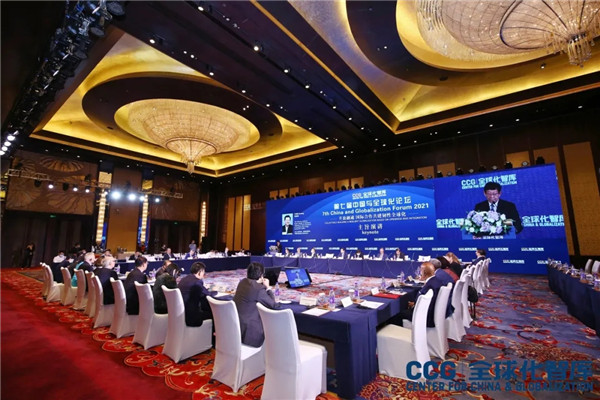
On July 29-30, the 7th China and Globalization Forum was held by CCG (Center for China and Globalization), China’s top non-governmental think tank, following its annual council meeting.
This year, in light of the once-in-a-century pandemic and the global challenges it has brought, CCG took the initiative to lead high-level discussions on the recovery of the global economy, trade and mobility, China-Europe economic cooperation, global cooperation under China’s new development plan, and China’s international communication. Discussion topics at the forum revolved around the theme “promoting openness and integration, building resilient globalization”.
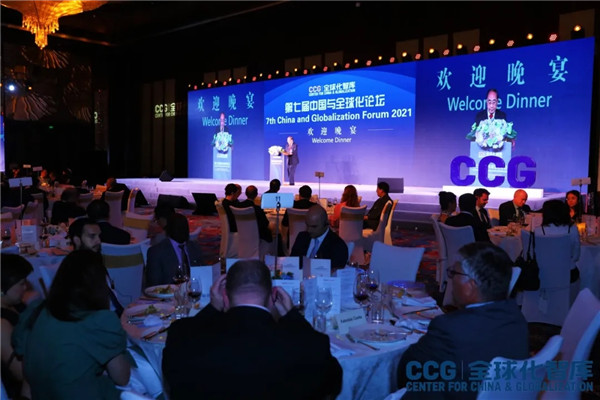
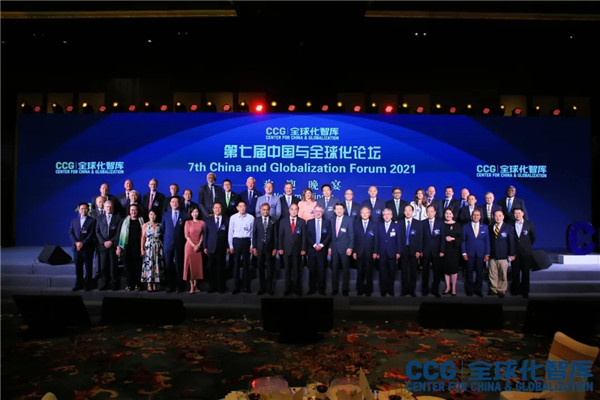

As a milestone in 2021, the forum had more than 400 distinguished guests taking part, including nearly 30 ambassadors to China; over 50 senior diplomats; representatives from international organizations, country heads of international trade groups, multinationals, and non-profits; government representatives from MFA, MOFCOM, NDRC, State Information Office and other major agencies, Beijing and other municipalities; high-profile business leaders and executives; celebrated scholars and experts from the academic and think tank communities; and chairmen, advisors, and council members of the CCG Advisory Council.
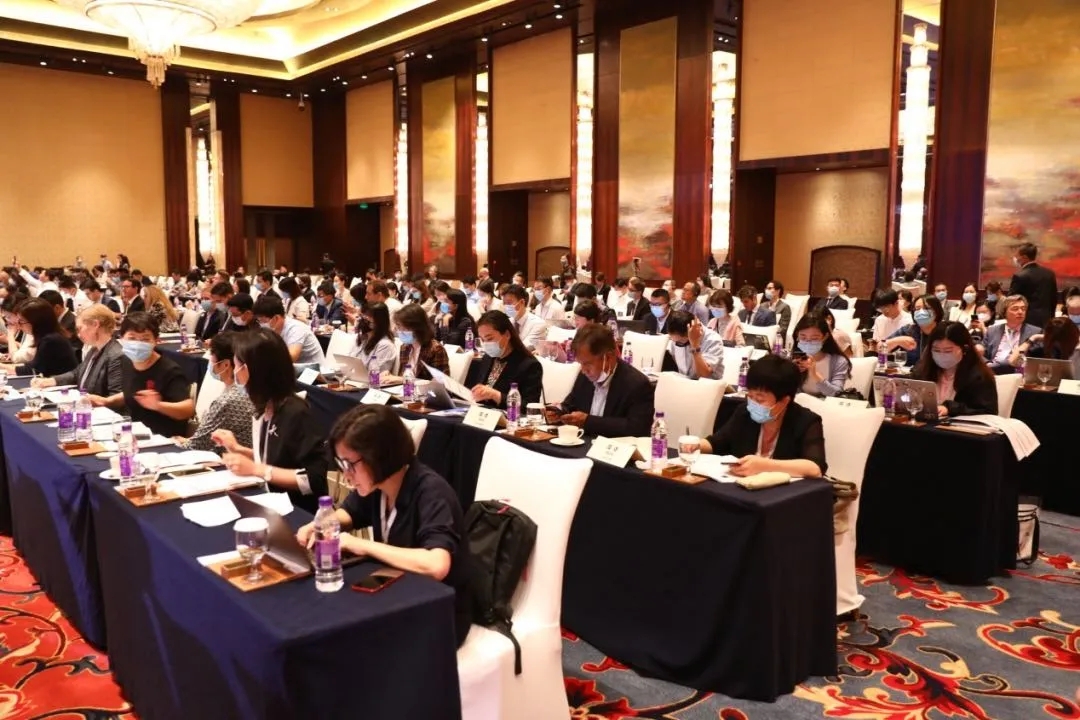
Keynote Speeches
On the evening of July 29, the welcome dinner of the 7th China and Globalization Forum was held. Dr. Wang Huiyao, president of CCG, delivered the welcome address. Keynote speeches were given by H.E. Wu Hongbo, the Special Representative of European Affairs of the Chinese government and the former Deputy Secretary-General of the UN; Mr. Siddharth Chatterjee, the UN Resident Coordinator in China; and H.E. Nicolas Chapuis, EU Ambassador to China.
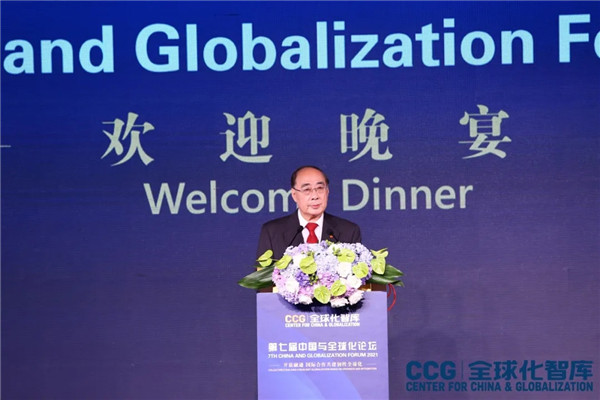
H.E. Wu Hongbo said that peace and sustainable development are closely linked. Should the international community safeguard the common interests of all members, peace and sustainable development will be maintained. The international order should not only uphold multilateralism, maintain fairness and justice and adhere to the UN Charter, but also adapt to the constant changes around the globe with innovative development concepts and practices.
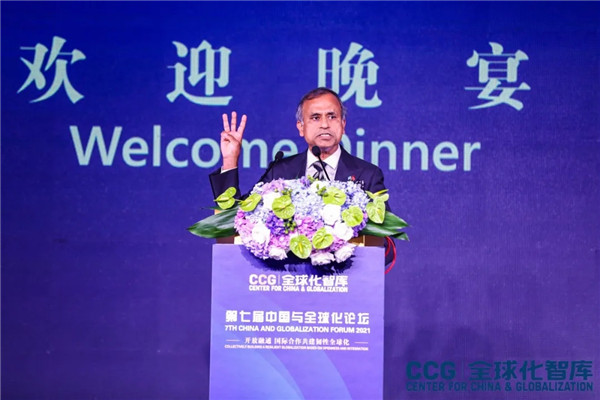
Siddharth Chatterjee stated that the past 50 years have been a miracle for both China and the UN, with China lifting 800 million people out of poverty in the last 40 years, not to mention that back in 1979, the GDP per capita of China was $180, yet today, this number has risen to $12,000 and is expected to increase to $25,000 by 2025. Further, a multilateral system that is dedicated to the modern and social development of humankind is of great importance as it ensures that no civilization is left behind. He also reaffirmed that the UN aims to secure equal opportunities for development for everyone and ensure its member states can fulfill its vision of progress.
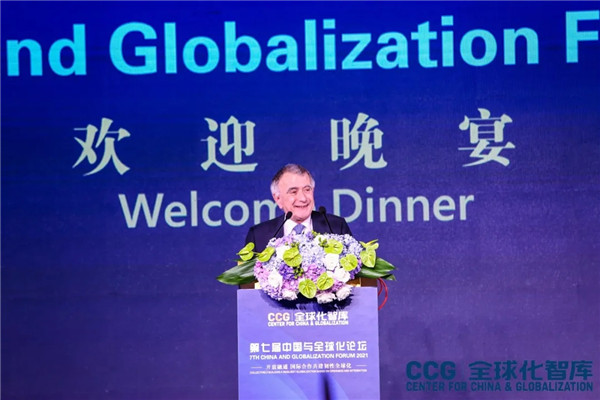
H.E. Nicolas Chapuis said, “Globalization means interdependence, which requires trust, fair competition, a level playing field, and, most importantly, common rules of engagement.” Further, he expressed the EU’s interest in collaborating with China on climate change and its efforts in fulfilling its commitment to carbon neutrality and shaping the standard for combating global climate change. In the past few weeks, the EU has passed the Recovery and Resilience Facility, which ensures that the European economy will reduce carbon emissions by 55% from the baseline of 1990 by 2023.
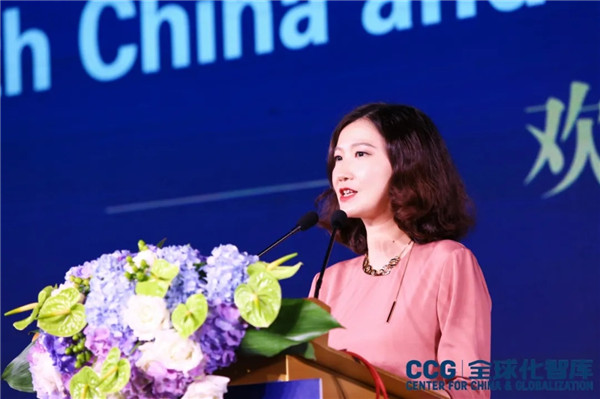
Dr. Lu Miao, CCG Secretary-General, introduced CCG’s Young Global Leaders Dialogue program (GYLD). She said that CCG should not only conduct research in regard to globalization, but also facilitate track II diplomacy from a global perspective. Particularly at this turbulent and critical time, CCG ought to build bridges between China and the world and tell China’s story better. With the young generation as a starting point, it wishes to bring together every age group to build trust, and learn from each other along the way to realizing the SDGs of the UN.
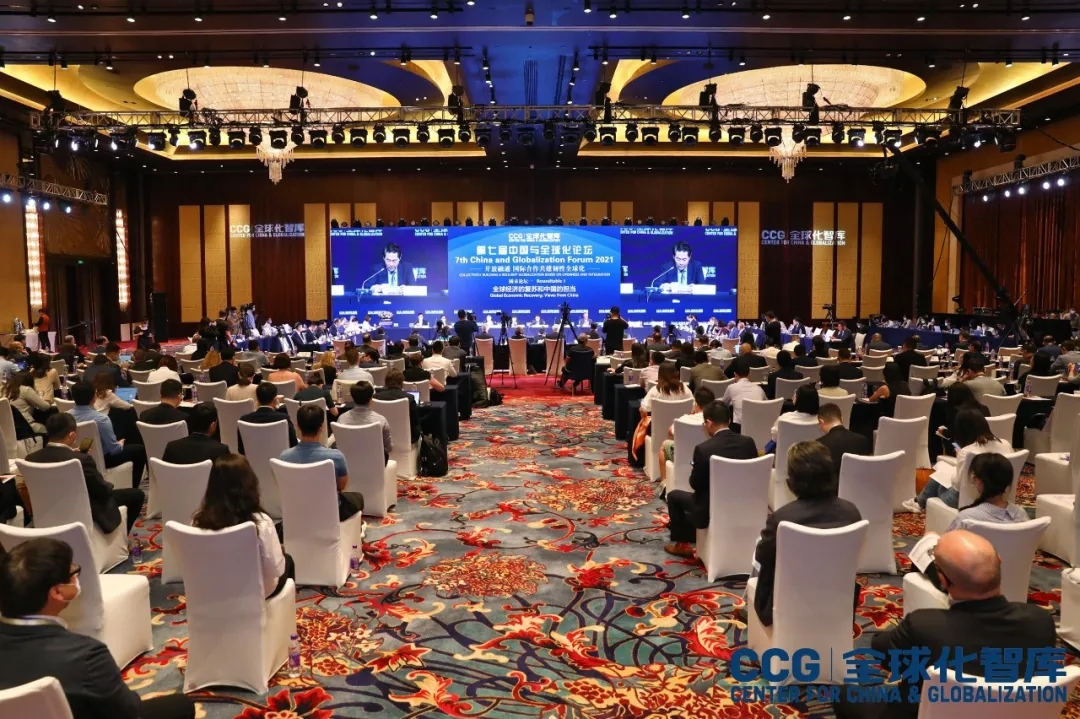
On July 30, the main forum took place, which consisted of the opening ceremony, five in-person roundtables, and three webinars.
Opening Remarks and Keynote Address
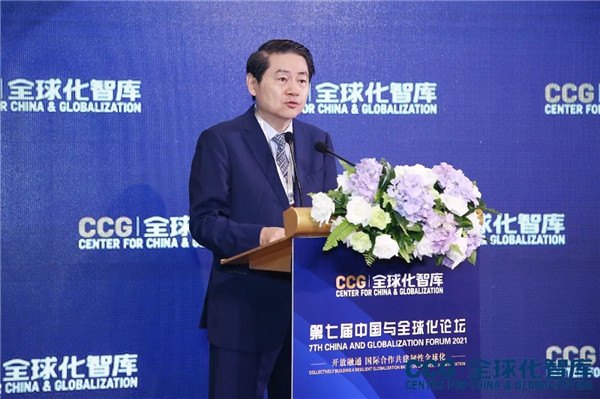
CCG President Dr. Wang Huiyao stated that the world is in need of more open dialogue and mutual understanding to secure the recovery of the global economy. Against the background of the turmoil faced by globalization in the past few years, CCG has continued to play its role as an envoy in building bridges between China and the world to enhance partnerships and collaboration between countries. For countries in the global community to work together and the economy to bounce back, cooperation and further opening of the economy are essential, as well as preventing further spread of Covid-19.
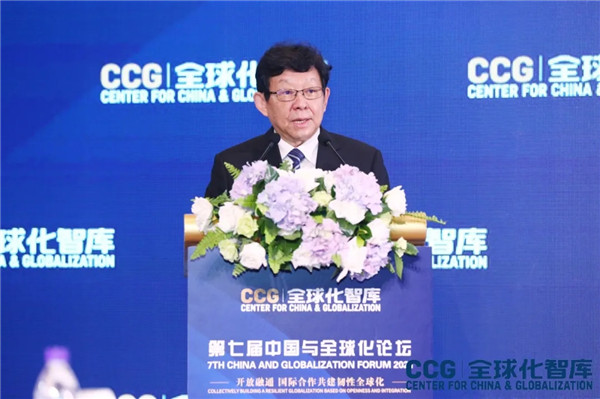
CCG Honorary Chairman and former Minister of Commerce and the Chairman of Foreign Investment Association, Chen Deming, in his keynote address, pointed out that 2021 marks the 50-year anniversary of China resuming its seat at the UN and the 20-year anniversary of China’s accession to WTO. He said that as China embarks on its new journey of building a socialist modernized country in an all-around way, we should aim to promote the “dual circulation” economic strategy and the multilateral system.
5 Roundtable Discussions
The crisis brought by COVID-19 and the challenge of climate change call for major reforms of global governance. The global economy has so far enjoyed a strong post-pandemic rebound yet owing to issues including underdevelopment and insufficient vaccine rollouts, this recovery remains very uneven.
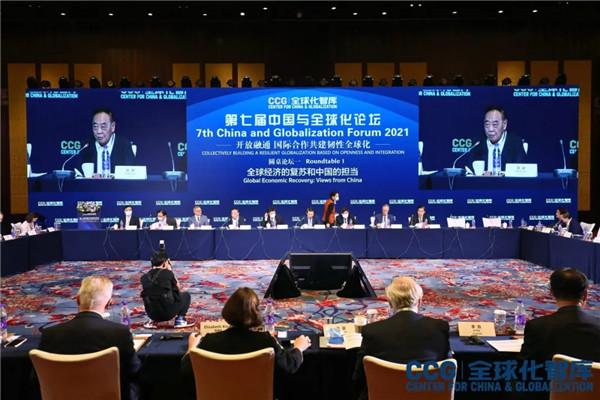
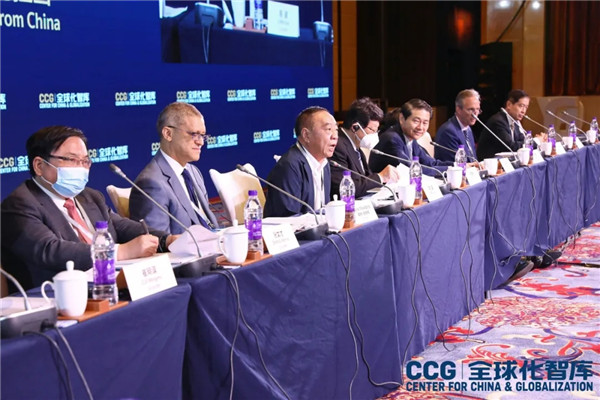
A roundtable with the theme of “global economic recovery: views from China” featured Chen Deming, CCG Honorary Chairman; former Minister of Commerce; Chairman of China Association of Enterprise with Foreign Investment (CAEFI); Chen Jian, CCG Advisor, former Vice Minister of Commerce; Cui Mingmo, President of MOFCOM China Association for International Economic Cooperation (CAFIEC); Leslie Maasdorp, Vice President and Chief Financial Officer, New Development Bank (NDB); Martin Raiser, Country Director for China and Mongolia and South Korea, World Bank; Zhao Bin, CCG Senior Council Member; Senior Vice President of Legal and Government Affairs, Qualcomm; Zhang Wencai, Vice President, Agricultural Development Bank of China and Zhu Guangyao, CCG Advisor; former Vice Minister of Finance; Counselor for China State Council. This roundtable was hosted by Dr. Wang Huiyao.
A defining feature of globalization is the cross-border movement of goods and services, capital, and people. As the ongoing Covid-19 pandemic continues to constrain global mobility, efforts are needed to recharge the momentum of global trade and investment.
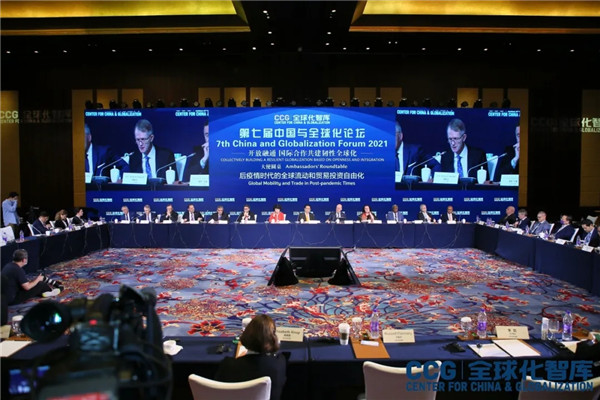
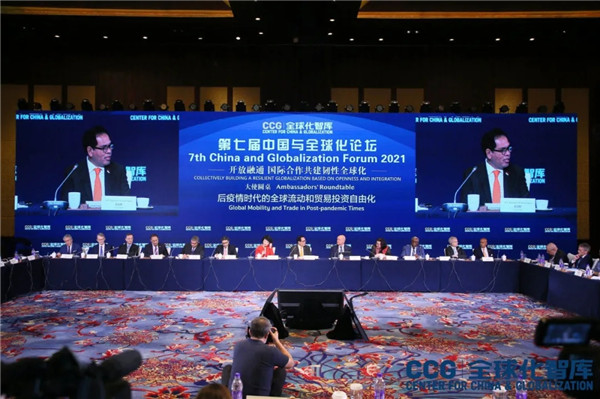
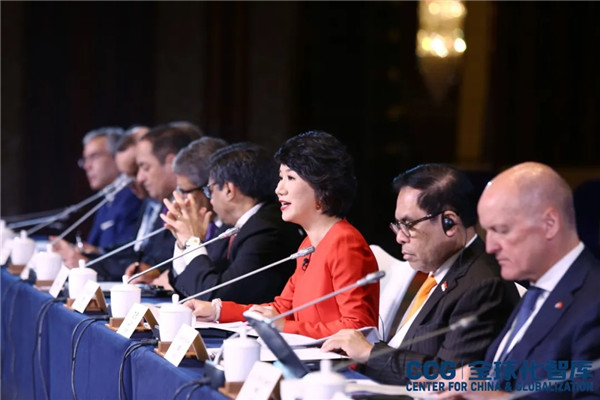
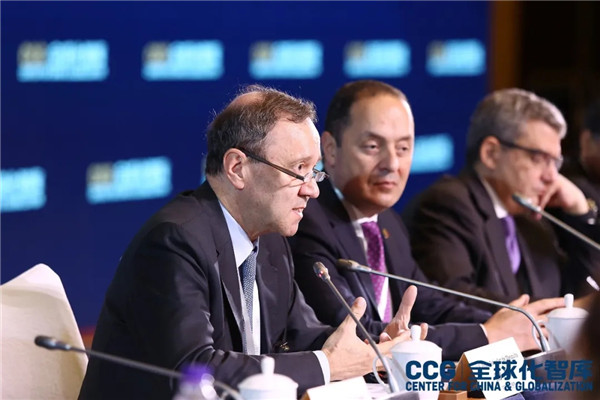
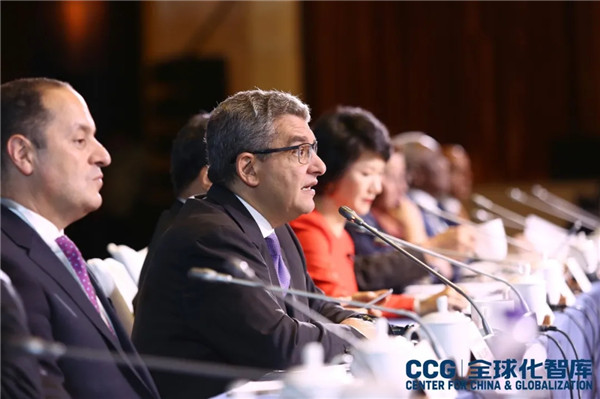
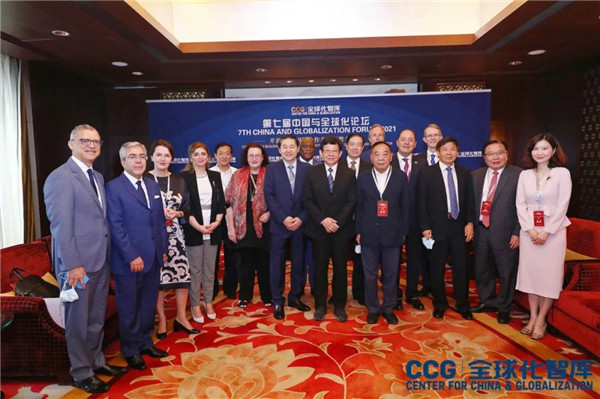
Thanks to vaccine rollouts, there are signs of increased mobility and large-scale reopening. The ambassadors’ roundtable discussed the theme “Post-pandemic global trade and mobility of the world.” The discussion featured H.E. Ahcene Boukhelfa, Ambassador of Algeria to China; H.E. Graham Fletcher, Ambassador of Australia to China; H.E. Paulo Estivallet de Mesquita, Ambassador of Brazil to China; H.E. Luis Diego Monsalve, Ambassador of Colombia to China; H.E. Mohamed Abd El-Sattar Elbadri, Ambassador of Egypt to China; H.E. Vikram Misri, Ambassador of India to China; H.E. Djauhari Oratmangun, Ambassador of Indonesia to China; H.E. Wim Geerts, Ambassador of Netherlands to China; H.E. Clare Fearnley, Ambassador of New Zealand to China; H.E. Siyabonga Cwele, Ambassador of South Africa to China; H.E. Bernardino Regazzoni, Ambassador of Switzerland to China; and H.E. Ali Obaid Al Dhaheri, Ambassador of UAE to China. This ambassadors’ roundtable was hosted by Liu Xin, CGTN anchor.
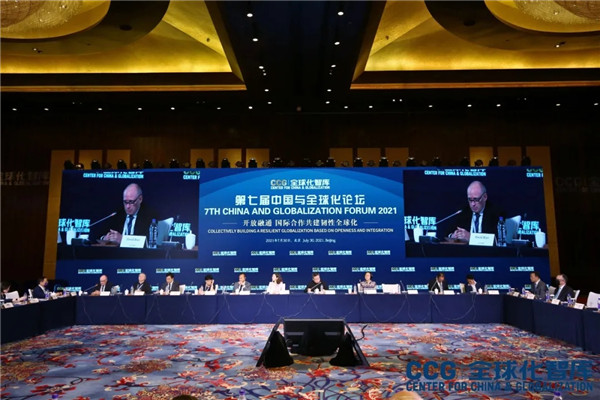
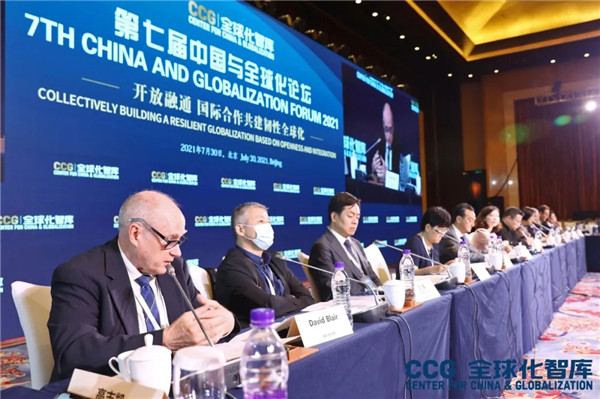
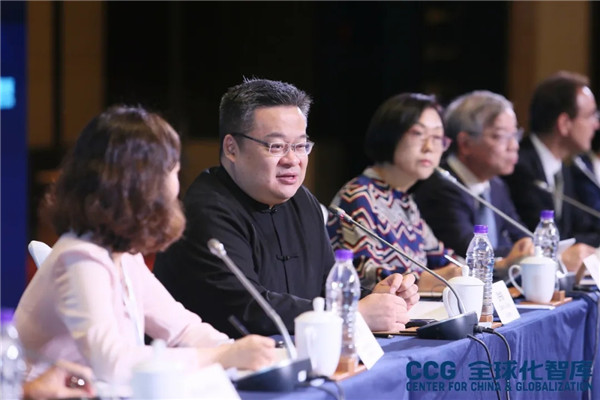
The evolving realities of China’s position in the world cannot be reduced to a simple story. This makes crafting narratives about China’s global role all the more important. With China’s rise to become the world’s largest developing country and second largest economy, the time has come to enhance its international communications capabilities. The next roundtable explored the subject “Shaping China’s narratives: the international community and beyond.” Speakers were David Blair, Vice President and Senior Economist at CCG; Mario Cavolo, Non-resident Senior Fellow at CCG; Dong Guanpeng , Vice Chairman, China Public Relations Association (CPRA); Dean, School of Government and Public Affairs, Communication University of China; Ji Hongbo, Country Representative of the Asia Foundation, Beijing Office; Huang Renwei, Executive director of the Belt and Road and Global Governance Institute at Fudan University, Former Vice President of Shanghai Academy of Social Sciences; Philip Kisray, Senior Vice President & General Manager, John Wiley & Sons; Mai Jun, Senior China Reporter, South China Morning Post (SCMP); Sun Ming, Vice President, Academy of Contemporary China and World Studies (ACCWS); Wang Hui, Professor and Director of Tsinghua Institute for Advanced Study in Humanities and Social Science (TIAS) and Wang Yiwei, Jean Monnet Chair Professor, Director of Institute of International Affairs at Renmin University of China. CCG Secretary-General, Dr. Miao Lu, was the host of this roundtable.
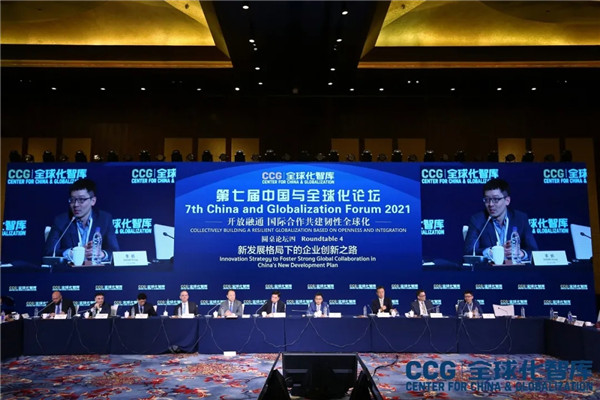
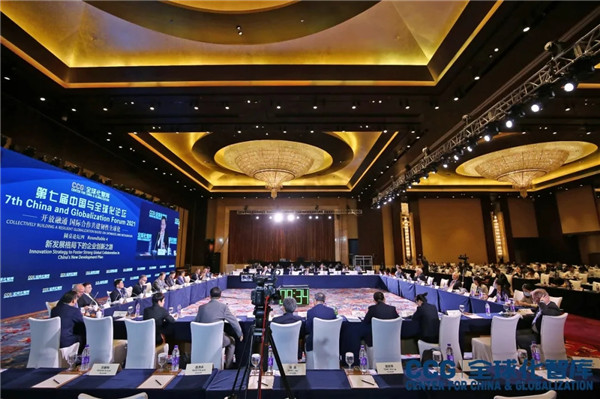
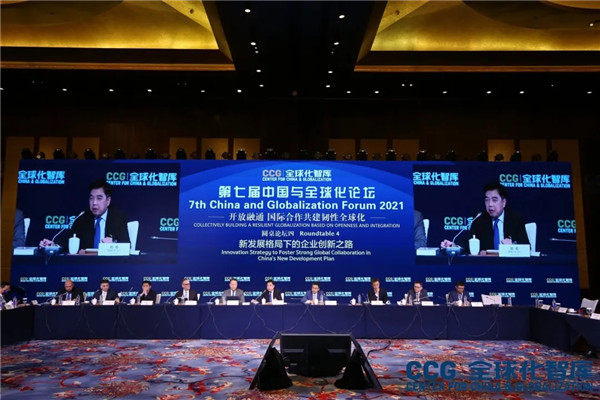
Steering and leading the “new normal” of economic development, China is set to foster new drivers of growth to address productivity challenges, deepen reforms, and promote greater innovation in the economy. Under the framework of the new 14th Five-Year Plan, multinationals will continue to play an important role in the Chinese economy.
The MNC roundtable took the theme “Innovation strategy to foster strong collaboration under China’s new development plan.” The participants were Vaughn Barber, Global Chair, KPMG Global China Practice; Co-Head of Infrastructure, KPMG China; Tony Chan, CEO, Abbott Diagnostics (China); Nick Coyle, CEO and Executive Director of AustCham China; Leng Yan, CCG Senior Council Member; Executive Vice President of Daimler Greater China; Howard Li, CCG Senior Vice Chair and Chairman and CEO of Waitex Group; Julian MacCormac, Chairman of the British Chamber of Commerce in China; President of Rolls-Royce China; Martin Mueller, Chairman of Swiss Chinese Chamber of Commerce; Shuai Peng, General Manager of Public Affairs, LinkedIn China; Tom Hsu, CCG Executive Council Member, Vice President of the VIA-HTC Group and CEO of Canaan Group; Xu Baoping, CCG Senior Council Member, Chairman of the Board of Directors of Knorr-Bremse Asia Pacific (Holding) Ltd.; and George Xu, CEO of Airbus China. The MNCs roundtable was hosted by Mike Liu, CCG Vice President; former Managing Director of DXC Technology, Greater China.
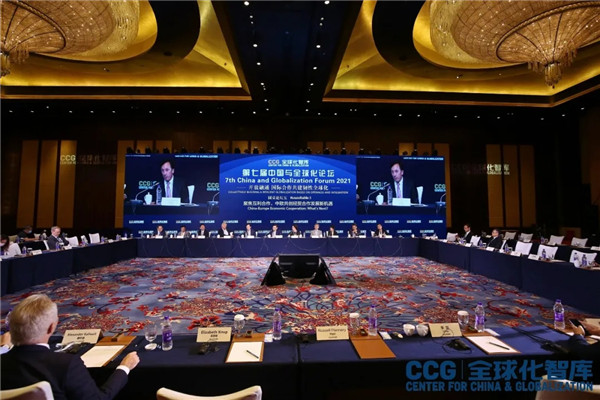
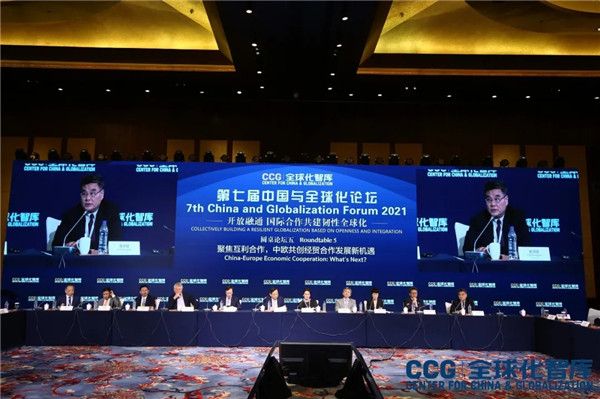
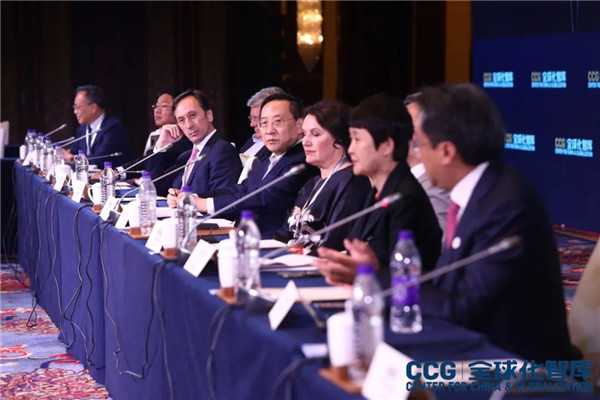
Last year, China overtook the US to become the largest trading partner of the European Union. While the trade and economic relationships remain stronger than ever, China and the EU are poised to cooperate on climate change and green development. Robust bilateral economic ties are crucial to the future of the China-EU Comprehensive Agreement on Investment (CAI).
The next roundtable took the theme “China-Europe economic cooperation: what’s next?” Participants were Cui Hongjian, CCG Senior Fellow; Senior Research Fellow and Director of the Department of European Studies at the China Institute of International Studies (CIIS); H.E. José Augusto Duarte, Ambassador of Portugal to China; Feng Zhongping, Director, Institute of European Studies, Chinese Academy of Social Sciences (CASS); Li Ye, CCG Senior Council Member; Vice President and Head of Corporate Affairs and Government Relations, Merck Holding (China), Ltd.; H.E. Alenka Suhadolnik, Ambassador of Slovenia to China; Sun Yongfu, CCG Senior Fellow; former Director-General of MOFCOM Department of European Affairs; Joerg Wuttke, President of EU Chamber of Commerce in China; Zhang Huarong, CCG Vice Chair; Chairman of Huajian Group; Antoine Weidong Zhang, Vice President, Chamber of Commerce and Industry France in China; Senior Vice President of Oulano (Asia); and William Weiliang Zhao, Country Chair of TotalEnergies China. This roundtable was hosted by Victor Gao, CCG Vice President.
Global Dialogue
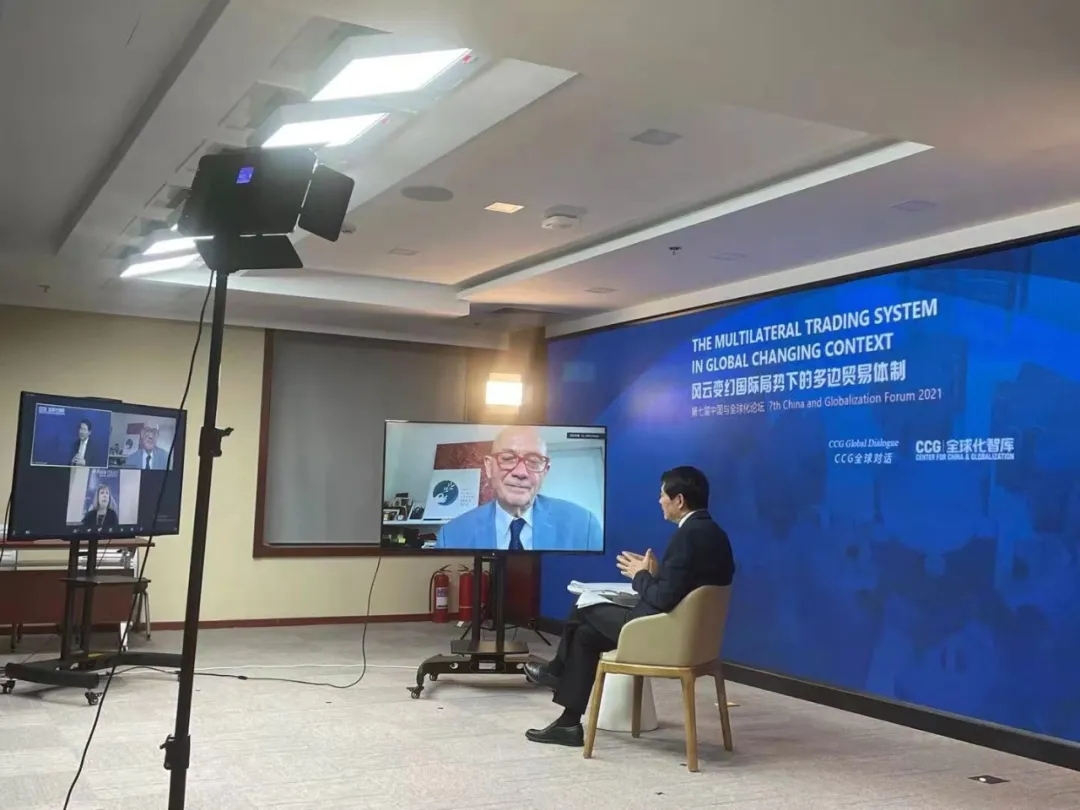
Dialogue on trade among Wendy Cutler, Pascal Lamy & Wang Huiyao
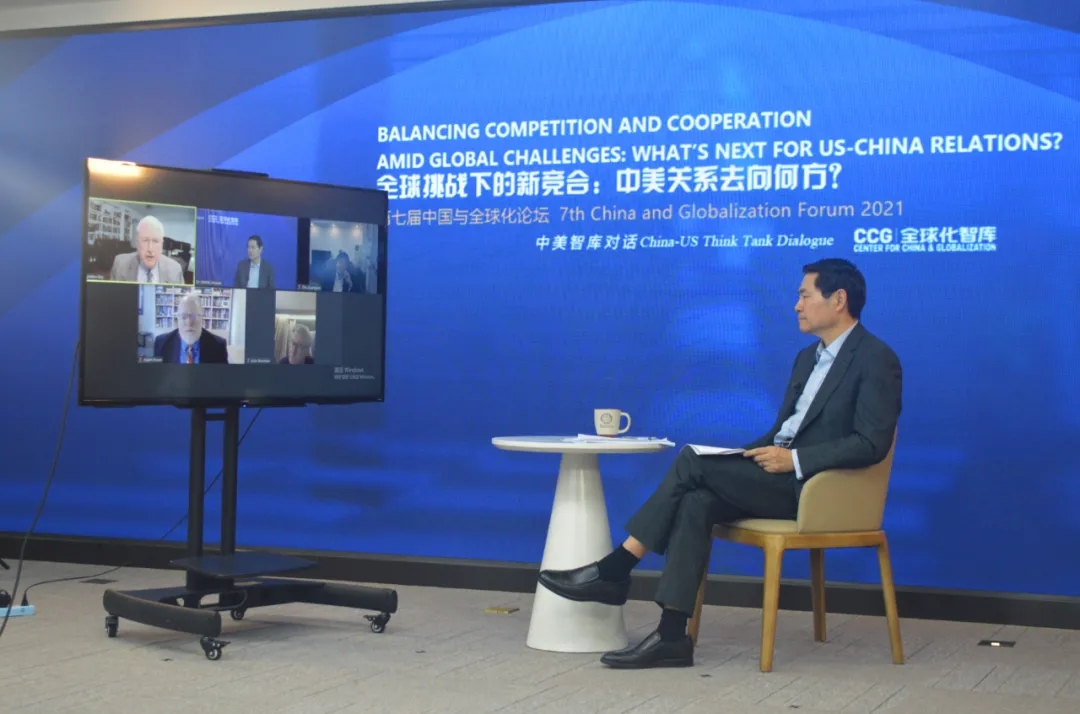
CCG Dialogue with John Thornton, Stapleton Roy and Adam Posen
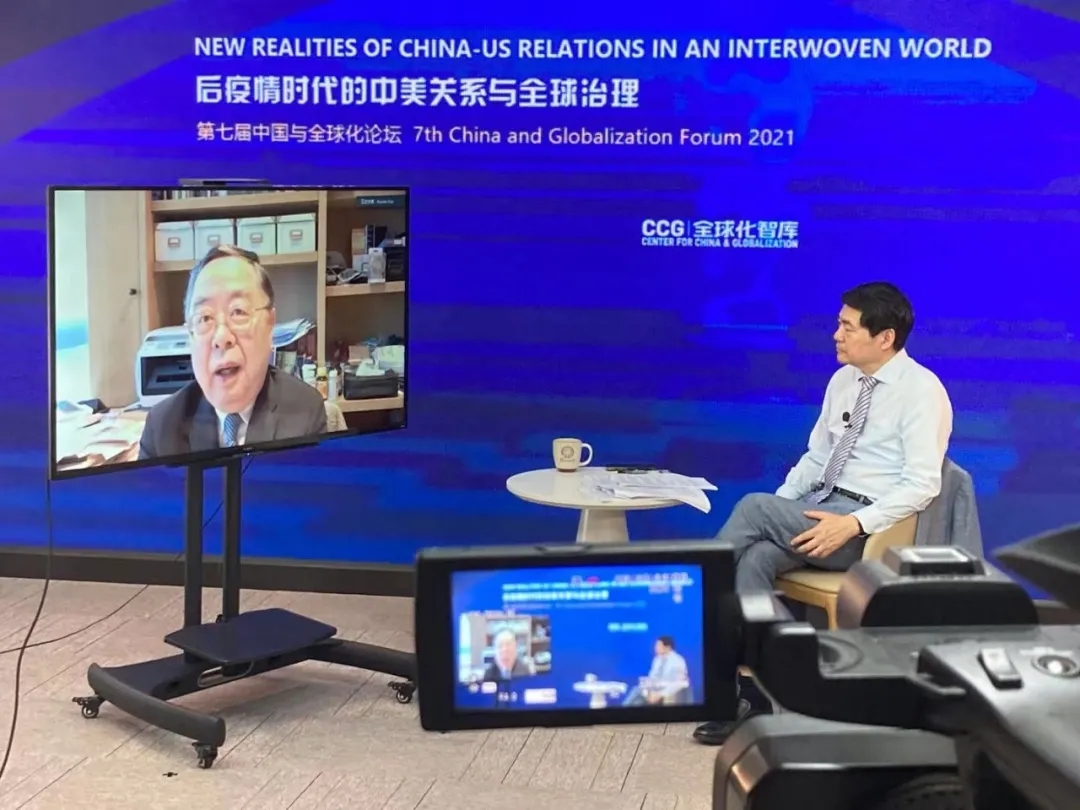
Dialogue among Susan Thornton, Ronnie Chan and Wang Huiyao
From the evening of July 30 to the evening of August 2, three forum feature webinars under the theme of “CCG Global Dialogue” were hosted by CCG President, Dr. Wang Huiyao. The discussions featured prominent experts and global opinion leaders such as: CCG Advisor and Zhu Guangyao, former Vice Minister of Finance; John L. Thornton, Chairman Emeritus of Brookings; J. Stapleton Roy, former US Ambassador to China; Susan A. Thornton, former Acting Assistant Secretary of State for East Asian and Pacific Affairs; Wendy Cutler, former Acting Deputy USTR; Pascal Lamy, former Director-General of the World Trade Organization and President of the Paris Peace Forum; Adam Posen, President of the Peterson Institute for International Economics; and Ronnie C. Chan, CCG Co-chair and Chair of Hang Lung Properties. The participants discussed issues concerning US-China relations, global governance, and the multilateral trading system.
Global Young Leaders Dialogue (GYLD)
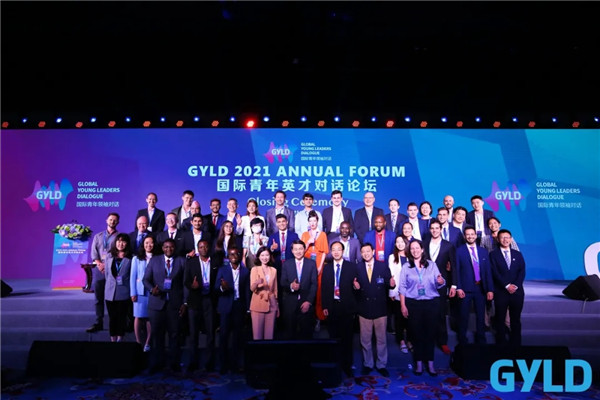
As a part of the 7th China and Globalization Forum, the CCG Global Young Leaders Dialogue (GYLD) program launched its inaugural GYLD Annual Forum on July 30, bringing together about 140 participants drawn from international circles of young professionals and entrepreneurs from nearly 30 countries and regions. The forum focused on sustainable development, public health, pandemic cooperation, technology innovation, open world economy and other global topics, to promote diverse cross-national, cross-disciplinary, and cross-generational perspectives towards building a better future for mankind.
Forthcoming Publications
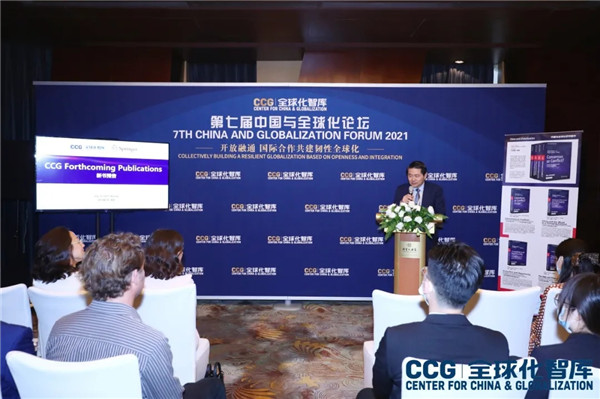
At the forum, CCG announced its forthcoming publication series with Springer Nature – “China and Globalization”. With the aim of addressing issues regarding globalization, global governance, international diplomacy and relations, economics and business, four forthcoming books from this series were introduced on July 30: Consensus or Conflict? – China and Globalization in the 21st Century, China and the World in a Changing Context – Perspectives from Ambassadors to China, Transition and Opportunity – Strategies from Business Leaders on Making the Most of China’s Future, and the Ebb and Flow of Globalization – Chinese Perspectives on China’s Development and Role in the World.
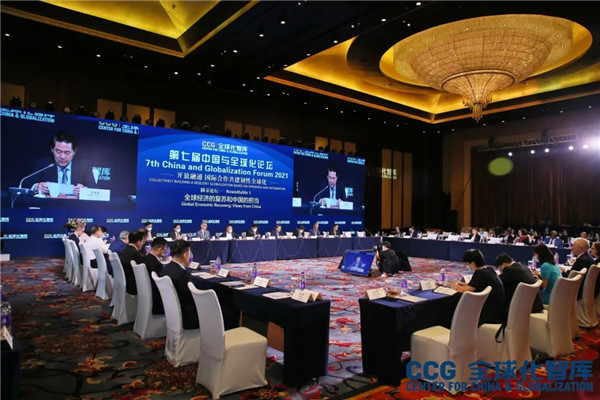
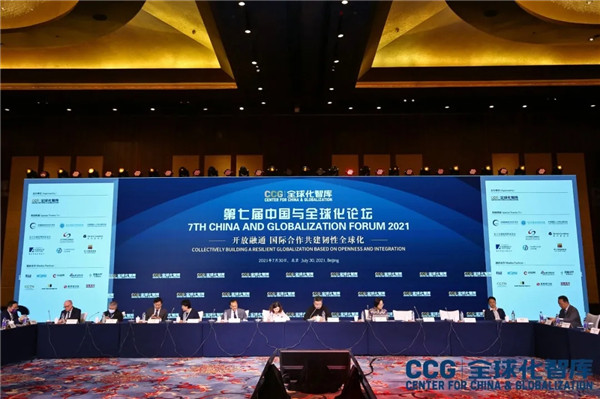
Attendees included:
· 27 ambassadors and charge d’affaires from countries including Algeria, Egypt, Australia, Bahamas, Brazil, Denmark, Canada, Georgia, Colombia, Denmark, European Union, Jamaica, Jordan, India, Lebanon, Madagascar, Mexico, Netherlands, New Zealand, Peru, Portugal, Switzerland, Slovenia, South Africa, UAE, Cape Verde, Croatia, Ireland and Kazakhstan. Senior officials from more than 20 embassies in China, including Cape Verde, Ireland, Croatia, Kazakhstan, Spain, Malaysia, Belgium, Japan, Uruguay, Indonesia, the United States, the United Kingdom, Russia, South Korea, Germany, Singapore, France, Italy, Egypt, Azerbaijan, and Chad.
· Representatives of government departments, including International Department of Central Committee of CPC, Organization Department of the Central Committee of the CPC, Publicity Department of the CPC, Ministry of Foreign Affairs of the PRC, Ministry of Public Security of the PRC, Ministry of Commerce of the PRC, Ministry of Science and Technology of the PRC, Ministry of Human Resources and Social Security of the PRC, Ministry of Education of the PRC, Ministry of Emergency Management of the PRC, Ministry of Ecological Environment of the PRC, Ministry of Agriculture and Rural Affairs of the PRC, National Development and Reform Commission, National Committee For the Chinese People’s Political Consultative Conference, Counsellors’ Office of the State Council, China Foreign Languages Publishing Administration, Beijing Municipal People’s Government, Information Office of Beijing Municipal People’s Government, Committee for Liaison with Hong Kong, Macao, Taiwan and Overseas Chinese of Beijing Municipal Committee of the Chinese People’s Political Consultative Conference, Human Resources Work Division of Beijing Municipal People’s Government.
· Heads of international organizations in China, including United Nations Industrial Development Organization, United Nations Development Programme, Joint United Nations Programme on HIV/AIDS, United Nations Women, International Committee of the Red Cross, World Bank.
· Representatives from organizations including the Chinese People’s Association for Friendship with Foreign Countries, China Public Diplomacy Association, China Public Relations Association, China Council for the Promotion of International Trade, Pacific Economic Cooperation Council,
· China Foundation for International Studies, China Foundation for Peace and Development, China Soong Ching Ling Foundation, Chinese Academy of Social Sciences, Academy of Contemporary China and World Studies, China Center for International Exchanges, China NGO Network for International Exchanges, China Association of International Trade.
· Heads of Chambers of Commerce, including the European Union Chamber of Commerce in China, Swiss Chamber of Commerce in China, Danish Chamber of Commerce in China, Malaysian Chamber of Commerce in China, Japanese Chamber of Commerce in China, Australian Chamber of Commerce in China, French Chamber of Commerce in China.
The forum was sponsored by China Association for International Economic Cooperation, the Academy of Contemporary China and World Studies, China Global Talent Society, China-United States Exchange Foundation, Konrad-Adenauer-Stiftung, Asia Foundation, Heren Charity Foundation, and the EU-Asia Center.
Looking Forward
As one of the world’s top 100 non-governmental think tanks according to UPenn’s Global Go To Think Tank Index, CCG actively engages in China’s globalization from an international perspective and contributes to policies relating to development and global governance in many countries. Over the years, the China and Globalization Forum has become a magnet for highly-regarded delegates from China’s government, academia, and business communities for dialogue and debate about the most pressing issues regarding the development of globalization and China’s role in it.
In the remainder of 2021, CCG is excited to present more events featuring a wide range of topics to continue to play a role in bridging understanding and differences between China and the world as a global think tank.





